new posts in all blogs
Viewing Blog: Darlene Beck-Jacobson, Most Recent at Top
Results 26 - 50 of 360

GOLD FROM THE DUST: Bringing Stories to Life
Recipes, crafts and activities for children using a multi-sensory approach. Advice and resources for writers of children's literature.
Statistics for Darlene Beck-Jacobson
Number of Readers that added this blog to their MyJacketFlap: 1
By: darlenebeckjacobson,
on 10/24/2014
Blog:
Darlene Beck-Jacobson
(
Login to Add to MyJacketFlap)
JacketFlap tags:
Add a tag
 darlenebeckjacobson:
darlenebeckjacobson:
Big Congratulations to fellow NJSCBWI member, illustrator Karen Romagna for her new Picture Book.
 Originally posted on Writing and Illustrating:
Originally posted on Writing and Illustrating:
Here is your chance to win a copy of Karen Romagna’s new book, VOYAGE. All you have to do is leave a comment and be willing to write a short review of the book if you win. The review can be on your blog, Amazon, Barnes and Noble, Facebook, or Goodreads. (See more at bottom of this post.)

Karen Romagna has just finished illustrating her first picture book. Voyage launched at The National Book Festival in Washington, DC on August 30, 2014 and is available in bookstores October 1, 2014. Written by former US Poet Laureate, Billy Collins, Voyage is the tale of a young boy setting off for an adventure on the open sea. Karen used the softness of watercolor in illustrating this wonderful dreamlike tale.

Karen is a traditional painter. Her illustrations are primarily done in watercolor However, she also loves painting in oil.
Karen grew up surrounded by…
View original 565 more words


By: darlenebeckjacobson,
on 10/24/2014
Blog:
Darlene Beck-Jacobson
(
Login to Add to MyJacketFlap)
JacketFlap tags:
Add a tag
By: darlenebeckjacobson,
on 10/24/2014
Blog:
Darlene Beck-Jacobson
(
Login to Add to MyJacketFlap)
JacketFlap tags:
Children,
art,
Activities,
web sites,
holiday crafts/gifts to make,
www.redtedart.com,
Home Schooling Ideas,
Easy Halloween Costumes for Kids,
www.surfnetkids.com,
Add a tag
I came across some great sights for unique, easy costume ideas for kids for Halloween. The first site Surf Net, has costumes for toddlers and school aged children. using items found around most houses. Check out their ideas at:
http://www.surfnetkids.com/halloween/homemade-costumes/
One of my favorite sites for kid-friendly crafts, and holiday decorations as well as costumes is one I’ve mentioned before on this blog: Red Ted Art. While looking for costume ideas, you might also check out the 20 Apple Crafts, 20 Pumpkin Ideas, and the Bat Crafts as well. http://www.redtedart.com
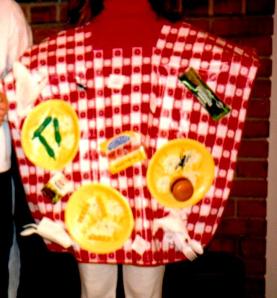
picnic table costume
Don’t forget, you can also have your child be his or her favorite Literary Character from a book by taking something unique from each character as the focus. One example would be to paint a lightning bolt on your son’s forehead and give him a pointed hat and he’s good to go as Harry Potter. A pointed hat, green face paint and a long black scarf that doubles as a cape makes a pretty acceptable witch. Dress your child in black turtleneck and tights and tie a sash around her middle and she’s an Oreo cookie. You your imagination and you won’t have to break the bank to be original.
HAPPY HALLOWEEN!


By: darlenebeckjacobson,
on 10/24/2014
Blog:
Darlene Beck-Jacobson
(
Login to Add to MyJacketFlap)
JacketFlap tags:
Add a tag
I came across some great sights for unique, easy costume ideas for kids for Halloween. The first site Surf Net, has costumes for toddlers and school aged children. using items found around most houses. Check out their ideas at:
http://www.surfnetkids.com/halloween/homemade-costumes/
One of my favorite sites for kid-friendly crafts, and holiday decorations as well as costumes is one I’ve mentioned before on this blog: Red Ted Art. While looking for costume ideas, you might also check out the 20 Apple Crafts, 20 Pumpkin Ideas, and the Bat Crafts as well. http://www.redtedart.com

picnic table costume
Don’t forget, you can also have your child be his or her favorite Literary Character from a book by taking something unique from each character as the focus. One example would be to paint a lightning bolt on your son’s forehead and give him a pointed hat and he’s good to go as Harry Potter. A pointed hat, green face paint and a long black scarf that doubles as a cape makes a pretty acceptable witch. Dress your child in black turtleneck and tights and tie a sash around her middle and she’s an Oreo cookie. You your imagination and you won’t have to break the bank to be original.
HAPPY HALLOWEEN!


 Originally posted on Writing and Illustrating:
Originally posted on Writing and Illustrating:
 Jersey Farm Scribe here on…
Jersey Farm Scribe here on…
A Dialogue Tune-up: Mastering Kid-Speak
Dialogue is one of the most important pieces of any manuscript, and this often goes double for children’s works. Dialogue moves the story along, develops the connection between your readers and the characters and keeps things tangible and realistic.
That means that mastering Kid-Speak is unequivocally important.
There is a rhyme and rhythm to the way that kids communicate, where they pause to think, how they choose their words, the direction their stream of conscious takes them in. I’ve often wondered if there are linguists who study children specifically. I bet we could learn a lot about the development of the brain and human instincts by looking at how and why kids pick their words.
As writers, if our characters don’t sound realistic, we’ve already lost the battle. It’s something a child will instantly and instinctively pick up on. The…
View original 743 more words


By: darlenebeckjacobson,
on 10/22/2014
Blog:
Darlene Beck-Jacobson
(
Login to Add to MyJacketFlap)
JacketFlap tags:
Add a tag
 Originally posted on Writing and Illustrating:
Originally posted on Writing and Illustrating:
 Jersey Farm Scribe here on…
Jersey Farm Scribe here on…
A Dialogue Tune-up: Mastering Kid-Speak
Dialogue is one of the most important pieces of any manuscript, and this often goes double for children’s works. Dialogue moves the story along, develops the connection between your readers and the characters and keeps things tangible and realistic.
That means that mastering Kid-Speak is unequivocally important.
There is a rhyme and rhythm to the way that kids communicate, where they pause to think, how they choose their words, the direction their stream of conscious takes them in. I’ve often wondered if there are linguists who study children specifically. I bet we could learn a lot about the development of the brain and human instincts by looking at how and why kids pick their words.
As writers, if our characters don’t sound realistic, we’ve already lost the battle. It’s something a child will instantly and instinctively pick up on. The…
View original 743 more words


By: darlenebeckjacobson,
on 10/19/2014
Blog:
Darlene Beck-Jacobson
(
Login to Add to MyJacketFlap)
JacketFlap tags:
Books,
Author Interview,
writing for children,
stories for children,
web sites,
writing non-fiction,
historical research,
kcswildfacts.com,
terrycjennings.com,
Add a tag
I am pleased to bring you a post from a writer friend TERRY JENNINGS, whose specialty is CHILDREN’S NON FICTION. here’s Terry:
If Dante had been a non-fiction writer, in the Divine Comedy he would have put a circle in hell for writers whose overriding vice is Pride of Research. I never read the Divine Comedy but I did read Dan Brown’s Inferno and I know Dante liked those little circles where you would burn for eternity to expiate your sins. So if at any time there is a writer’s confessional, I would have to own up to that vicious sin—researching so much and having such pride in my cool factoids and data that sometimes I forget that the research should play a supporting role, not be all consuming like the fires of hell. And the part that makes this whole thing vicious is that along with pride can come a bit of arrogance and infallibility. I’ve done all this research and I know all there is to know, right? Recently, during the editing of my fact-based picture book, Sounds of the Savana (Arbordale, 2015), fate (or my sweet editor, whichever you choose) knocked me off my high horse.
Normally, my problem is not to include every tidbit and morsel in a manuscript. That is a sin I have worked hard to overcome. I figure I have slaved to get those lovely little gems and I have to put them somewhere. They have to be of use. I try dropping them into cocktail conversation. For instance, “Did you know that vervet monkeys have different kinds of vocalizations for different predators?” Or “Did you know spiny mice slough off their skin if a predator catches them? All that nasty owl will get is a piece of skin—and the mouse’s skin regrows by the next day. Imagine that!” I eat up that kind of stuff, but it makes people around me fall asleep.
Since I can’t use them socially, I want to include all my new knowledge in my manuscript. After many rejections, however, I have learned to listen to the wise and include only what works organically in the story, what drives the story forward. I have had to, sadly, leave a lot of wonderful information behind, condemning it to that nether world of unused facts. At first it was hard, but working with Arbordale has eased the pain. They have back matter in each book. A place where I can display many of my beloved nuggets. And if there’s not enough room in the back matter, they have a website with lots more information and activities. And when I remembered my own website could be a third bucket into which I could drop the remaining morsels, I danced a jig.
Now that I have the perfect place for all my darlings, the stories flow more easily. They can be even more engaging. I don’t have to explain that sound waves are deflected by temperature differences in Sounds. All I have to do is have a lioness roar on one side of the lake and the wildebeest hear her as if she were right next to them. Then . . . in the back matter or the website, I can put all sorts of amazing stuff about how the layer of cool temperature over a warm lake can deflect the sound wave so that it travels farther than when the temperature is uniform. I can let them know that in a 60 mile circle around Mount St. Helens, no one heard the eruption. They saw it like a silent movie—all because of the temperature difference between the roiling volcano and the layer of cool 8:32-in-the-morning atmosphere above it.
Pride of Research can also lead to avoidance. There is many a time when I’m almost ready to let the book go but I talk myself into just a bit more research so I don’t have to let my baby out into the world so everyone will say it’s ugly. Or the writing’s going bad and I dive headlong into a new strand of investigation so I don’t have to face my shortcomings.
With Pride of Research also comes a certain arrogance. Admit it. I know you’re out there. Just like me. We check and triple check every fact and have three page bibliographies for an 800 word piece. It doesn’t have to be overt self-importance. It can just be that cozy warm feeling that we’ve done your job well. We always try to do our job well. Carolyn Yoder (editor at Calkins Creek, an imprint for historical children’s books) would be proud.
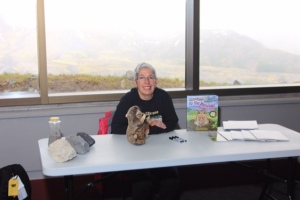
That, however, is exactly how my pride of research came tumbling down around me.
“So, the illustrator wants to know what kind of owl would eat a spiny mouse?”
My sweet editor at Arbordale sent shivers of shame down my spine. In Sounds of the Savanna, “sound” shows up through predator and prey interactions. Since predators silently sneak, swoop, snatch, and stalk and prey squeak, squeal, heeaw, kerchew—actually make sound—when caught or almost caught, I foolishly concentrated on the prey. Every stalked critter, big and small was thoroughly researched. Its demeanor, its diet, its vocalizations, how it takes care of its offspring and of course, which animals preyed on it were minutely scrutinized. And it goes without saying I already knew they lived on the Savanna because that was my first criterion for choosing the species. But the predators? I had given them nary a thought. The research on the spiny mouse said owls eat them and that was good enough for me. Without much thought I could write that the owl swoops on silent wings with deadly talons—beautiful, although generic, tags—and that was sufficient. Was it arrogance or just plain forgetfulness? I know better. When I wrote my book about the recovery after Mount St. Helens’ eruption, I had tons of lists of the trees and animals that lived on the mountain and approximately when the species returned. I can’t believe I didn’t check on the spiny mouse’s predator. Turns out the Verreaux or Milky Eagle Owl loves spiny mice. And it didn’t take me too long to find it. Phew!
If that had been all, I might have come out with my dignity bruised, but still extant. But not long after the owl came the question about the vervet monkeys and their predator. Vervet monkeys have a vocalization for snakes. What snakes? All I could find was boas. My idea of a boa is huge. Vervet monkeys, not so big. I suggested they avoid the conundrum altogether by having the snake hidden in the grass. But by now I was absolutely distraught. Really? Two unidentified predator species? How could I? I checked to make sure there were no more hanging in the breeze and it turns out there weren’t. The other predators were well known dudes like leopards and lions, animals an illustrator can draw without getting down to differentiating between species.
I have been chastened, however. I promise to never let my pride of research make me blind to the shortcomings of my manuscript ever again. I will continue to do my job well, even better than I have because as non-fiction or fact-based fiction writers for children we are passing that information on to kids, and perhaps some day some one will take our book and use it as fodder to his or her pride of research.
Bio:
Terry Jennings began writing in 1999. Her first piece “Moving Over to the Passenger’s Side,” about teaching her fifteen-year-old to drive was published by The Washington Post. She has written a few other articles for them and Long Island News Day, as well as Ranger Rick, and a family humor column in my local newspaper, The Reston Connection.
She also writes educational text for the Smithsonian Science Education Center and other educational outlets. Gopher to the Rescue! A Volcano Recovery Story (Sylvan Dell, 2012) was named Outstanding Science Trade Book by the National Science Teachers’ Association and the Children’s Book Council. Her other book, The Women’s Liberation Movement: 1960-1990 (Mason Crest, 2013) was named to the Amelia Bloomer Project’s recommended feminist literature for women birth to 18. Sounds of the Savanna, a book about sound as told through predator/prey interactions in the African savanna is on its way with Arbordale Publishers. It’s due out fall of 2015. Terry is currently working on a historical novel about the Cuban Revolution (1959-1961) loosely based on my childhood along with a couple of other picture books–one on Magnetism and one on Erosion. 
Contact her at:
website: Terrycjennings.com
science blog for kids: kcswildfacts.com


By: darlenebeckjacobson,
on 10/19/2014
Blog:
Darlene Beck-Jacobson
(
Login to Add to MyJacketFlap)
JacketFlap tags:
Add a tag
I am pleased to bring you a post from a writer friend TERRY JENNINGS, whose specialty is CHILDREN’S NON FICTION. here’s Terry:
If Dante had been a non-fiction writer, in the Divine Comedy he would have put a circle in hell for writers whose overriding vice is Pride of Research. I never read the Divine Comedy but I did read Dan Brown’s Inferno and I know Dante liked those little circles where you would burn for eternity to expiate your sins. So if at any time there is a writer’s confessional, I would have to own up to that vicious sin—researching so much and having such pride in my cool factoids and data that sometimes I forget that the research should play a supporting role, not be all consuming like the fires of hell. And the part that makes this whole thing vicious is that along with pride can come a bit of arrogance and infallibility. I’ve done all this research and I know all there is to know, right? Recently, during the editing of my fact-based picture book, Sounds of the Savana (Arbordale, 2015), fate (or my sweet editor, whichever you choose) knocked me off my high horse.
Normally, my problem is not to include every tidbit and morsel in a manuscript. That is a sin I have worked hard to overcome. I figure I have slaved to get those lovely little gems and I have to put them somewhere. They have to be of use. I try dropping them into cocktail conversation. For instance, “Did you know that vervet monkeys have different kinds of vocalizations for different predators?” Or “Did you know spiny mice slough off their skin if a predator catches them? All that nasty owl will get is a piece of skin—and the mouse’s skin regrows by the next day. Imagine that!” I eat up that kind of stuff, but it makes people around me fall asleep.
Since I can’t use them socially, I want to include all my new knowledge in my manuscript. After many rejections, however, I have learned to listen to the wise and include only what works organically in the story, what drives the story forward. I have had to, sadly, leave a lot of wonderful information behind, condemning it to that nether world of unused facts. At first it was hard, but working with Arbordale has eased the pain. They have back matter in each book. A place where I can display many of my beloved nuggets. And if there’s not enough room in the back matter, they have a website with lots more information and activities. And when I remembered my own website could be a third bucket into which I could drop the remaining morsels, I danced a jig.
Now that I have the perfect place for all my darlings, the stories flow more easily. They can be even more engaging. I don’t have to explain that sound waves are deflected by temperature differences in Sounds. All I have to do is have a lioness roar on one side of the lake and the wildebeest hear her as if she were right next to them. Then . . . in the back matter or the website, I can put all sorts of amazing stuff about how the layer of cool temperature over a warm lake can deflect the sound wave so that it travels farther than when the temperature is uniform. I can let them know that in a 60 mile circle around Mount St. Helens, no one heard the eruption. They saw it like a silent movie—all because of the temperature difference between the roiling volcano and the layer of cool 8:32-in-the-morning atmosphere above it.
Pride of Research can also lead to avoidance. There is many a time when I’m almost ready to let the book go but I talk myself into just a bit more research so I don’t have to let my baby out into the world so everyone will say it’s ugly. Or the writing’s going bad and I dive headlong into a new strand of investigation so I don’t have to face my shortcomings.
With Pride of Research also comes a certain arrogance. Admit it. I know you’re out there. Just like me. We check and triple check every fact and have three page bibliographies for an 800 word piece. It doesn’t have to be overt self-importance. It can just be that cozy warm feeling that we’ve done your job well. We always try to do our job well. Carolyn Yoder (editor at Calkins Creek, an imprint for historical children’s books) would be proud.

That, however, is exactly how my pride of research came tumbling down around me.
“So, the illustrator wants to know what kind of owl would eat a spiny mouse?”
My sweet editor at Arbordale sent shivers of shame down my spine. In Sounds of the Savanna, “sound” shows up through predator and prey interactions. Since predators silently sneak, swoop, snatch, and stalk and prey squeak, squeal, heeaw, kerchew—actually make sound—when caught or almost caught, I foolishly concentrated on the prey. Every stalked critter, big and small was thoroughly researched. Its demeanor, its diet, its vocalizations, how it takes care of its offspring and of course, which animals preyed on it were minutely scrutinized. And it goes without saying I already knew they lived on the Savanna because that was my first criterion for choosing the species. But the predators? I had given them nary a thought. The research on the spiny mouse said owls eat them and that was good enough for me. Without much thought I could write that the owl swoops on silent wings with deadly talons—beautiful, although generic, tags—and that was sufficient. Was it arrogance or just plain forgetfulness? I know better. When I wrote my book about the recovery after Mount St. Helens’ eruption, I had tons of lists of the trees and animals that lived on the mountain and approximately when the species returned. I can’t believe I didn’t check on the spiny mouse’s predator. Turns out the Verreaux or Milky Eagle Owl loves spiny mice. And it didn’t take me too long to find it. Phew!
If that had been all, I might have come out with my dignity bruised, but still extant. But not long after the owl came the question about the vervet monkeys and their predator. Vervet monkeys have a vocalization for snakes. What snakes? All I could find was boas. My idea of a boa is huge. Vervet monkeys, not so big. I suggested they avoid the conundrum altogether by having the snake hidden in the grass. But by now I was absolutely distraught. Really? Two unidentified predator species? How could I? I checked to make sure there were no more hanging in the breeze and it turns out there weren’t. The other predators were well known dudes like leopards and lions, animals an illustrator can draw without getting down to differentiating between species.
I have been chastened, however. I promise to never let my pride of research make me blind to the shortcomings of my manuscript ever again. I will continue to do my job well, even better than I have because as non-fiction or fact-based fiction writers for children we are passing that information on to kids, and perhaps some day some one will take our book and use it as fodder to his or her pride of research.
Bio:
Terry Jennings began writing in 1999. Her first piece “Moving Over to the Passenger’s Side,” about teaching her fifteen-year-old to drive was published by The Washington Post. She has written a few other articles for them and Long Island News Day, as well as Ranger Rick, and a family humor column in my local newspaper, The Reston Connection.
She also writes educational text for the Smithsonian Science Education Center and other educational outlets. Gopher to the Rescue! A Volcano Recovery Story (Sylvan Dell, 2012) was named Outstanding Science Trade Book by the National Science Teachers’ Association and the Children’s Book Council. Her other book, The Women’s Liberation Movement: 1960-1990 (Mason Crest, 2013) was named to the Amelia Bloomer Project’s recommended feminist literature for women birth to 18. Sounds of the Savanna, a book about sound as told through predator/prey interactions in the African savanna is on its way with Arbordale Publishers. It’s due out fall of 2015. Terry is currently working on a historical novel about the Cuban Revolution (1959-1961) loosely based on my childhood along with a couple of other picture books–one on Magnetism and one on Erosion. 
Contact her at:
website: Terrycjennings.com
science blog for kids: kcswildfacts.com


I am thrilled to bring you today’s post from fellow blogger Katey Howes who blogs about literacy, parenthood and writing for kids at: http://www.katiewrites.wordpress.com
Every Monday her blog features a new Raising Readers post to help parents raise kids who love books. Katey is mom to 3 girls and countless manuscripts, all of which vie for her time and attention. She wrote this seated on a kid-sized chair while supervising the painting of wooden treasure chests from the craft store. The dishwasher and clothes washer were running, but there was still a good bit of cinnamon sugar on the floor from cooking streusel muffins with the kids that morning. (My kind of Mom!)
You can often find Katey discussing children’s literature, song parodies and household disasters on twitter @kateywrites or on Facebook at her author page: http://www.facebook.com/kateywrites
Here’s Katey:
My hall closet, originally intended for coats, is absolutely stuffed with boxes of board games and puzzles. I have a hard time resisting a new game – especially one that tricks my kids into using their brains. Unfortunately, it seems like these games get more expensive every time I turn around. Just today I came across a boxed set of card games that promise to help preschoolers with their letter skills: 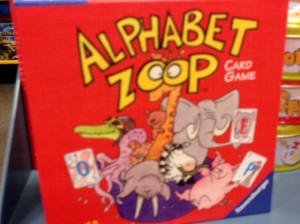
From what I understand, this box contains 2 sets of 26 letter cards, a joker, and instructions for alphabet-themed versions of traditional games. For $19.95.
ABC Go Fish? Great idea!
$20 worth of great? No way.
Index cards and markers great? Oh, yes.
As a matter of fact, there are a lot of great, educational games you can make at home for a lot less money and just as much fun.
Don’t Say It retails for $16.95 and can be best described as Taboo for kids. Each card has a key word at the top. The goal is for the player to read that word silently, then describe the word in such a way that other players can guess what it is. The challenge? The player describing the word cannot say the other words on the card. For example, a player may need to get others to say “PIG,” but without using “sty” “bacon” “ham” or “mud.” 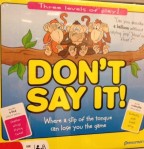
Want to make it yourself? Index cards or card stock, a list of vocabulary words and your imagination are all you need. To level the challenge for kids of different ages, you can make your own rules: perhaps kindergarteners can’t use the 1st word on the list, but can use the others.
Want to leave the hard part up to someone else? Lucky for you Teach Speech 365 made a fabulous version of this game and sells the printables for $5.50 at Teachers Pay Teachers. http://www.teacherspayteachers.com/product/Dont-Say-It-Describing-Dash-461132 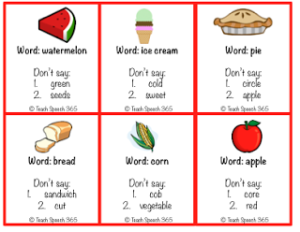
Zingo is the name given to a variety of products that help practice literacy skills like letter recognition, sight word reading, and simple spelling. The games come with a dispenser that pops out cards when you push the handle. Players then try to match the card to their playing card. The first to fill their card Bingo-style wins.
I love these games – and kids do, too. But buying a new one for each level of learning is an expensive proposition – since each dispenser and card set are a slightly different size from the others. I recommend skipping the bells and whistles and simply creating your own BINGO cards using the parts of speech your child is currently working on. http://www.BingoBaker.com makes it quick and easy to create printable templates.
Scrabble Junior claims to make the classic game easy and fun for kids – and does so by providing you with a game board pre-printed with words for kids to fill in. For older kids, the back side of the board is more like a traditional Scrabble board, so it grows with kids. If you don’t already have Scrabble around the house, this may be worth the $13 it retails for at Toys R Us. If you already own Scrabble, think instead of making cards with words from your child’s classroom list. Draw tiles from the handy bag and see who can fill in their cards first!
Scrabble also sells a game called Alphabet Scoop with a fun twist. All the tiles are placed in a bowl. Each player has 1-3 cards with words on them. They take turns scooping out tiles with a spoon and trying to fill in their word cards with matching tiles. Fill in a word and yell out “Yummy!” to win. Again – seems pretty easy to make a version of this at home and customize it to your children’s reading levels!
Kids Charades from Family Fun retails for $19.95 at Barnes and Noble and other retailers. It is a great way to get reluctant readers to get in on the action, as they draw a card, read it to themselves, and then act it out for the group. Once again, with a little ingenuity, a kitchen timer and a stack of scrap paper you can make this at home in a flash – and tailor it to your children’s interests and reading levels. You could even put favorite book titles or characters into the mix! 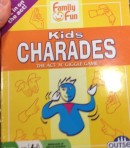
My kids – and my daughter’s Daisy troop – totally love the game Hedbanz – at least, when we make it ourselves. I have yet to cave and buy the boxed game that sells for $15-$20. Here’s how it works:
Players draw a card and do NOT look at it. Instead they stick it to their forehead, facing out, so that the other players can see/read it. Use elastic headbands worn sweat-band style around the forehead to hold the card in place. (Or, if you’re short on supplies, just write your clues on post-its and smack ‘em on the kids’ heads!) 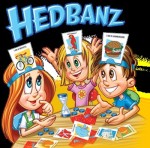
Players then take turns asking questions like “Am I an animal?” “Do I have four legs?” and the like until they guess who they are. The player to guess first OR the player to guess the most cards by the time a timer runs out is the winner. Make this game easier for beginning readers by using pictures with words. Make it harder by eliminating the pictures. Have kids studying together? How about making it fun by putting glossary terms on their heads? “Am I metamorphic rock?” “Am I magma?” “Am I George Washington Carver?” The possibilities are endless.
I’m sure there are plenty of you out there with ideas for games you can make at home for less. I’d love for you to share them in the comments. And if you’re looking for more games that grow brains, check out Board Games That Build Readers and Board Games That Build (Bigger) Readers on Kateywrites. 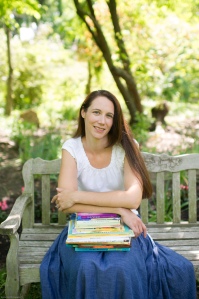
I wish I’d thought of some of these great ideas to use when my kids were small. They are great for classroom use as well, since we teachers are on a tight budget. Thanks for a fabulous post Katey!


By: darlenebeckjacobson,
on 10/17/2014
Blog:
Darlene Beck-Jacobson
(
Login to Add to MyJacketFlap)
JacketFlap tags:
Add a tag
I am thrilled to bring you today’s post from fellow blogger Katey Howes who blogs about literacy, parenthood and writing for kids at: http://www.kateywrites.wordpress.com
Every Monday her blog features a new Raising Readers post to help parents raise kids who love books. Katey is mom to 3 girls and countless manuscripts, all of which vie for her time and attention. She wrote this seated on a kid-sized chair while supervising the painting of wooden treasure chests from the craft store. The dishwasher and clothes washer were running, but there was still a good bit of cinnamon sugar on the floor from cooking streusel muffins with the kids that morning. (My kind of Mom!)
You can often find Katey discussing children’s literature, song parodies and household disasters on twitter @kateywrites or on Facebook at her author page: http://www.facebook.com/kateywrites
Here’s Katey:
My hall closet, originally intended for coats, is absolutely stuffed with boxes of board games and puzzles. I have a hard time resisting a new game – especially one that tricks my kids into using their brains. Unfortunately, it seems like these games get more expensive every time I turn around. Just today I came across a boxed set of card games that promise to help preschoolers with their letter skills: 
From what I understand, this box contains 2 sets of 26 letter cards, a joker, and instructions for alphabet-themed versions of traditional games. For $19.95.
ABC Go Fish? Great idea!
$20 worth of great? No way.
Index cards and markers great? Oh, yes.
As a matter of fact, there are a lot of great, educational games you can make at home for a lot less money and just as much fun.
Don’t Say It retails for $16.95 and can be best described as Taboo for kids. Each card has a key word at the top. The goal is for the player to read that word silently, then describe the word in such a way that other players can guess what it is. The challenge? The player describing the word cannot say the other words on the card. For example, a player may need to get others to say “PIG,” but without using “sty” “bacon” “ham” or “mud.” 
Want to make it yourself? Index cards or card stock, a list of vocabulary words and your imagination are all you need. To level the challenge for kids of different ages, you can make your own rules: perhaps kindergarteners can’t use the 1st word on the list, but can use the others.
Want to leave the hard part up to someone else? Lucky for you Teach Speech 365 made a fabulous version of this game and sells the printables for $5.50 at Teachers Pay Teachers. http://www.teacherspayteachers.com/product/Dont-Say-It-Describing-Dash-461132 
Zingo is the name given to a variety of products that help practice literacy skills like letter recognition, sight word reading, and simple spelling. The games come with a dispenser that pops out cards when you push the handle. Players then try to match the card to their playing card. The first to fill their card Bingo-style wins.
I love these games – and kids do, too. But buying a new one for each level of learning is an expensive proposition – since each dispenser and card set are a slightly different size from the others. I recommend skipping the bells and whistles and simply creating your own BINGO cards using the parts of speech your child is currently working on. http://www.BingoBaker.com makes it quick and easy to create printable templates.
Scrabble Junior claims to make the classic game easy and fun for kids – and does so by providing you with a game board pre-printed with words for kids to fill in. For older kids, the back side of the board is more like a traditional Scrabble board, so it grows with kids. If you don’t already have Scrabble around the house, this may be worth the $13 it retails for at Toys R Us. If you already own Scrabble, think instead of making cards with words from your child’s classroom list. Draw tiles from the handy bag and see who can fill in their cards first!
Scrabble also sells a game called Alphabet Scoop with a fun twist. All the tiles are placed in a bowl. Each player has 1-3 cards with words on them. They take turns scooping out tiles with a spoon and trying to fill in their word cards with matching tiles. Fill in a word and yell out “Yummy!” to win. Again – seems pretty easy to make a version of this at home and customize it to your children’s reading levels!
Kids Charades from Family Fun retails for $19.95 at Barnes and Noble and other retailers. It is a great way to get reluctant readers to get in on the action, as they draw a card, read it to themselves, and then act it out for the group. Once again, with a little ingenuity, a kitchen timer and a stack of scrap paper you can make this at home in a flash – and tailor it to your children’s interests and reading levels. You could even put favorite book titles or characters into the mix! 
My kids – and my daughter’s Daisy troop – totally love the game Hedbanz – at least, when we make it ourselves. I have yet to cave and buy the boxed game that sells for $15-$20. Here’s how it works:
Players draw a card and do NOT look at it. Instead they stick it to their forehead, facing out, so that the other players can see/read it. Use elastic headbands worn sweat-band style around the forehead to hold the card in place. (Or, if you’re short on supplies, just write your clues on post-its and smack ‘em on the kids’ heads!) 
Players then take turns asking questions like “Am I an animal?” “Do I have four legs?” and the like until they guess who they are. The player to guess first OR the player to guess the most cards by the time a timer runs out is the winner. Make this game easier for beginning readers by using pictures with words. Make it harder by eliminating the pictures. Have kids studying together? How about making it fun by putting glossary terms on their heads? “Am I metamorphic rock?” “Am I magma?” “Am I George Washington Carver?” The possibilities are endless.
I’m sure there are plenty of you out there with ideas for games you can make at home for less. I’d love for you to share them in the comments. And if you’re looking for more games that grow brains, check out Board Games That Build Readers and Board Games That Build (Bigger) Readers on Kateywrites. 
I wish I’d thought of some of these great ideas to use when my kids were small. They are great for classroom use as well, since we teachers are on a tight budget. Thanks for a fabulous post Katey!


I don’t know about you, but this year’s mild summer and fall produced a bumper crop of veggies in our garden. Especially zucchini. If you are still picking this versatile vegetable, or are just looking for a new way to get your children to eat more veggies, this recipe will do it. It’s so simple and DELICIOUS. Even reluctant eaters should give it a try.
Zucchini Pancakes
1. Wash a medium size zucchini and pat it dry. SHRED into a large bowl. You should have about 2 Cups.
2. Add the following: 3 T. flour (or biscuit mix), 1/3 C grated Parmesan Cheese, a sprinkling of onion powder and a dash of salt.
3. Beat an egg and add to the mixture, stirring until all the mix is wet. 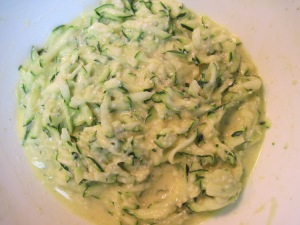
4. Put 1T oil in a skillet or on a griddle, spreading it around to coat the pan.
5. Pour spoonfuls of the zucchini mix onto the hot skillet and spread out into a thin layer. Cook until browned and then flip.
6. Serve hot. These pancakes make a great side dish and are reminiscent of potato pancakes.
Variations: Try using grated beets or carrots for a sweeter tasting pancake. Or mix half zucchini and half carrot. You can also add 2 T of minced onion to the mix instead of the onion powder.
What do you think? Is this recipe a winner?
Recipe Card Give-Away: If you’d like a set of the FOUR recipes found in my MG novel WHEELS OF CHANGE, leave a comment or your favorite zucchini recipe. I’ll put everyone’s name in a hat and choose TWO winners. You have until 10-31 to post your comments. 


By: darlenebeckjacobson,
on 10/13/2014
Blog:
Darlene Beck-Jacobson
(
Login to Add to MyJacketFlap)
JacketFlap tags:
Add a tag
I don’t know about you, but this year’s mild summer and fall produced a bumper crop of veggies in our garden. Especially zucchini. If you are still picking this versatile vegetable, or are just looking for a new way to get your children to eat more veggies, this recipe will do it. It’s so simple and DELICIOUS. Even reluctant eaters should give it a try.
Zucchini Pancakes
1. Wash a medium size zucchini and pat it dry. SHRED into a large bowl. You should have about 2 Cups.
2. Add the following: 3 T. flour (or biscuit mix), 1/3 C grated Parmesan Cheese, a sprinkling of onion powder and a dash of salt.
3. Beat an egg and add to the mixture, stirring until all the mix is wet. 
4. Put 1T oil in a skillet or on a griddle, spreading it around to coat the pan.
5. Pour spoonfuls of the zucchini mix onto the hot skillet and spread out into a thin layer. Cook until browned and then flip.
6. Serve hot. These pancakes make a great side dish and are reminiscent of potato pancakes.
Variations: Try using grated beets or carrots for a sweeter tasting pancake. Or mix half zucchini and half carrot. You can also add 2 T of minced onion to the mix instead of the onion powder.
What do you think? Is this recipe a winner?
Recipe Card Give-Away: If you’d like a set of the FOUR recipes found in my MG novel WHEELS OF CHANGE, leave a comment or your favorite zucchini recipe. The recipes are for PEACH PIE, GINGERBREAD, SUGAR COOKIES, AND BISCUITS. I’ll put everyone’s name in a hat and choose TWO winners. You have until 10-31 to post your comments. 


 darlenebeckjacobson:
darlenebeckjacobson:
My wonderful agent is featured on today’s post by Kathy Temean.
 Originally posted on Writing and Illustrating:
Originally posted on Writing and Illustrating:
 Liza Leissig of the Liza Royce Agency has agreed to be our First Page Guest Critiquer for October.
Liza Leissig of the Liza Royce Agency has agreed to be our First Page Guest Critiquer for October.
Liza Fleissig, with her partner Ginger Harris-Dontzin, opened the Liza Royce Agency (LRA) in early 2011. Prior to that she had represented a large number of adult based fiction and non-fiction writers.
I invited Liza and Ginger to the New Jersey SCBWI Conference and introduce many of the writers to her that year in June 2011. Liza took on a number of those writers and has successfully placed 31 children’s manuscripts with publishers since then. She has proven herself as a real go getter.
A graduate of the University of Pennsylvania’s Wharton School of Business with a BS in Finance, and the Benjamin N. Cadozo School of Law with a JD, Liza brings 20 years of litigation and negotiating experience to the field. On the children’s side of publishing, being a mother to a preschooler girl and a…
View original 170 more words


On Monday I featured some new iPhone Apps for kids. Today I have three free ones to download onto you Android device.
1. HAY DAY: A building game in a happy country town filled with positive, colorful things and lots of fun for young kids.
2. KIDS DOODLE – COLOR AND DRAW: Your kids will love this drawing app thanks to its colorful options and ability to play back their drawings in a video montage.
3. BUBBLE POPPING FOR BABIES: A very simple game for your baby or toddler. Various forms of ocean life trapped in bubbles are released when baby touches them. Great for building eye-hand co-ordination.
What are your kids’ favorite Apps?


 Originally posted on Laura Sassi Tales:
Originally posted on Laura Sassi Tales:

One of the basic rules of picture book writing is that writers need to let the illustrations tell part of the story. Teachers, parents, and kids can have fun looking for this principle in action in GOODNIGHT, ARK. This activity should have a game-like quality as you and your child hunt for extra funny bits that are only in the pictures!
To get you started, here are some great examples of how illustrator Jane Chapman uses illustration to add humor and even extra plot details to GOODNIGHT, ARK. Look carefully, for they are subtly sprinkled throughout her rich and colorful spreads.
Extra Animals: In addition to the key players, Jane adds extra animal guests. I found nine extra pairs. Can you?
Extra (funny!)provisions: The text makes no mention of specific provisions, leaving lots of room for Jane to add humorous extras like the canned cat food that rolls across the floor on…
View original 190 more words


 Originally posted on Booksalmagundi:
Originally posted on Booksalmagundi:

Title of Book: Wheels of Change
ISBN: 978-1-939547-13-2
From the Book Jacket: Racial intolerance, social change, sweeping progress. It is a turbulent time growing up in 1908. For twelve year old EMILY SOPER, life in Papa’s carriage barn is magic. Emily is more at home hearing the symphony of the blacksmith’s hammer, than trying to conform to the proper expectations of females. Many prominent people own Papa’s carriages. He receives an order to make one for President Theodore Roosevelt. Papa’s livelihood becomes threatened by racist neighbors, and horsepower of a different sort. Emily is determined to save Papa’s business even if she has to go all the way to the President.
An Interview with Darlene Beck-Jacobson
If you had to describe your book in two sentences, what would they be?
Life altering changes are coming for Emily Soper and her family. How can Emily decide what changes are…
View original 422 more words


Whether you’re planning a fall road trip or have a long wait at the doctor or dentist, you can keep your children busy with these new FREE apps to download onto your APPLE iPhone.
1. MY HORSE: If you don’t have room in your apt. or backyard for a real horse, get your child a virtual one to love and care for.
2. SPONGE BOB DINER DASH: This game allows the player to help serve customers at the Krusty Krab and make sure they all have a good time.
3. MY LITTLE PONY – FRIENDSHIP IS MAGIC: Help My Little Pony and friends rebuild the town to restore it to sparkling magic.
4. PBS KIDS VIDEO: Numerous PBS apps feature a large inventory of video clips from popular TV shows. For multiple age groups.
Tune in on Friday for more free apps for ANDROID devices.


THE AMAZING STORY GENERATOR
By
Jason Sacher (Chronicle Books 2012 $14.95 hardcover) 
“Longing for a simpler life, famous Children’s Book Author joins a cult.”
“Penniless after years of rejection, Picture Book Author wannebe, dons a cape and mask to fight crime.”
“During the hottest summer on record, an out- of -work writer refuses to leave the bathtub.”
Are these tabloid headlines or stressed out writers looking for easier ways to earn a living? The answer to those questions just might be the basis of your next story.
The concept of THE AMAZING STORY GENERATOR is unique and simple. You choose a prompt from each of three sections set up in a flip-book style – a setting, a character, and a conflict. Written down, it becomes your “elevator pitch” and the start of a story, novel, screenplay or picture book.
This book is entertaining to read in and of itself. Passing it around among family members left all of us laughing and contemplating all sorts of possible scenarios. At its best, this book is a perfect when you need a jump start for a story, a new idea, or a way out of writer’s block. It’s a useful format for summing up your own stories or novels that are ready to be “pitched” to editors and agents. You can create thousands of different prompts and storylines. I found that practicing the format opens up endless ideas. 
Here’s an example using one setting, one character, and several conflicts:
“Suddenly able to hear others’ thoughts, a spoiled teenager solves a ten year old murder, OR robs a series of banks, OR wakes up in a strange house.”
Do the same thing by varying the settings or characters and you can see the endless possibilities. Who knows, you could have the formula for the next mystery/sci-fi/YA thriller.
THE AMAZING STORY GENERATOR is the perfect addition to any creative writing program and should be part of every storytellers library.
“Inspired by THE AMAZING STORY GENERATOR, a children’s author writes the next bestseller.”
It could happen. Even if it doesn’t, think of what a great story it would make.


I “met” Janet after reading her fabulous YA historical novels and letting her know how much I enjoyed them. She was kind enough to read WHEELS OF CHANGE before it was published and wrote a wonderful blurb that appears in the book. We’ve had an e-mail friendship ever since. I couldn’t wait to talk to Janet about her YA novels and her new venture: a debut MG. Janet was also kind enough to feature me on her blog today. You can check out that post at: http://www.kidswriterjfox.blogspot.com
1. SIRENS takes place in the “Roaring Twenties”. What attracted you to writing about that era? 
SIRENS is set in New York City in 1925. When seventeen-year-old Josephine Winter’s father ships her off to live with her rich cousins on the glittering island of Manhattan, he says it’s to find a husband. But Jo knows better–there’s trouble brewing, and in 1925, all that glitters is not gold. Caught up in a swirl of her cousin’s bobbed-hair set–and the men that court them–Jo soon realizes that this world of jazz and gangsters and their molls hides a nest of lies. But when she befriends the girlfriend of one of the most powerful and dangerous gangsters in town, Jo begins to uncover secrets–secrets that threaten an empire and could destroy everyone she loves. Jo is faced with a choice: hang on to her soul, or lose herself in the decade of decadence.
My first two YA historical novels were contracted for together, and I linked them by tying in characters, although the second is not strictly a sequel. Just as I was putting the finishing touches on FORGIVEN my publisher contacted my agent and asked if I would be interested in trying my hand at a novel set in the 1920s. I said yes, and wrote a proposal, and they accepted it.
I don’t always say yes to suggestions like this. But I’ve always been fascinated by the twenties – it was a time of such rapid social change as to be explosive. Plus there are nuances like the fascination with the supernatural and the subtle political rumblings that led straight toward World War II. I had a lot of fun researching and writing SIRENS.
2. You wrote two other wonderful YA Historical Fiction books: FAITHFUL and FORGIVEN. How did you come to be a writer of historical fiction?
Thank you! It was a total accident. I don’t consider myself to be an historical fiction author, and in fact most of my current projects are anything but. FAITHFUL, my first novel, was really written as a way for me to deal with the sudden death of my mother. When I went to craft Maggie’s story about her search for her mother, I picked Yellowstone as a setting, and 1904 as the year only because I was interested in that period of history and it’s a fantastic period within the Park. 
FORGIVEN carries on from FAITHFUL but I set it in San Francisco because as a former geologist I wanted to write about the 1906 earthquake. 
3. As someone who also writes historical fiction, I’m interested in how you conduct your research. Tell us about your process.
I almost never research ahead. It’s important to me to know my character first, so I often write quite a bit before I feel the need to dig into research. Once I know my character, then I try to craft a story that will delve into the rich human experience. And then I often research on the fly – hunting for material that I need to know.
For example, with SIRENS, I knew Jo and I knew she was going to befriend Lou, and I knew the two girls would get mixed up somehow with a gangster and bootlegging. But it wasn’t until I heard a radio interview one winter night with the author of a book about the 1920’s magician Howard Thurston that I realized that the twenties’ obsession with spiritualism would be central to my theme. It fit my character, it fit the story, and it was an interesting aspect of the twenties that doesn’t get much attention.
That said, at some point I do the following: read newspaper ads and articles of the period; read something written in the period; read the society columns of the time; find vocabulary lists or terms popular at the time; find clothing catalogs of the time; look for popular pastimes. These all comprise my socio-economic understanding, the atmosphere that surrounds my character.
4. You recently sold your first middle grade historical titled CHATELAINE: THE THIRTEENTH CHARM. Can you tell us about that and how it was writing your first MG novel?
Actually CHATELAINE is much more fantasy than historical. Yes, it’s set in 1940 and the children are escaping the blitz; yes, there is a German spy and an enigma machine. But after that, it’s very much a story about ghosts, a steampunk witch, an immortal wizard, children who are disappearing, artifacts with magical powers, peculiar teachers, a creepy castle, the rainy Scottish Highlands…in short, a slightly scary run-for-your-life mystery.
I loved writing this novel. It came out of nowhere – actually it was inspired by a piece of jewelry I saw on the internet – but as I was writing I was remembering all those days as a preteen when I was holed up in the corner on a rainy afternoon with one of the Narnia books or an Agatha Christie novel. Kat is such a great character and I had so much fun writing her story and then embellishing it with wild and crazy twists and turns…I hope readers will love it, too.
It sounds amazing Janet. I will definitely be adding that one to my reading list!
5. Of all your memorable characters, which one is your favorite and why?
Wow. That’s like loving one of your children more than the others!
I guess if I had to be pinned to the wall, I would say Maggie, because she’s my first. But then there’s Kula, feisty Kula, who begged to have her story told. And Jo – she’s such a determined, strong-willed girl – and Lou, who comes from nothing and has street-smarts. Now Kat, she’s the pragmatic girl who has to develop her imagination…and then there’s Rima, from my next novel…obviously, this is the impossible choice!
Thanks so much, Darlene! 
Janet Fox writes award-winning fiction and non-fiction for children of all ages. She became a children’s author in the mid-90s, when her son’s learning differences led her to develop her non-fiction book for Free Spirit Publishing, GET ORGANIZED WITHOUT LOSING IT (2006). Other work for children includes short fiction (Spider Magazine) and science non-fiction (Highlights for Children). Her young adult debut novel, FAITHFUL (Speak/Penguin Group, 2010) was an Amelia Bloomer List pick, and was followed by a companion novel, FORGIVEN (Penguin, 2011), a Junior Library Guild selection and WILLA Literary Award Finalist, and a YA historical set in the 1920s, SIRENS (Penguin, 2012).
Her debut middle grade novel CHATELAINE: THE THIRTEENTH CHARM is an historical fantasy (Viking, 2016). She is a 2010 graduate of the MFA/Writing for Children and Young Adults program at Vermont College of Fine Arts, a former Regional Advisor for the Society of Children’s Book Writers and Illustrators, and a former high school English teacher. Janet lives in Bozeman, Montana, where Janet and her husband enjoy the mountain vistas.
You can also find her at http://www.janetsfox.com and at http://www.kidswriterjfox.blogspot.com




I’ve been reading a lot of great children’s books lately and want to tell you about three I recently enjoyed.
1. DON’T TURN THE PAGE by Rachelle Burk (Creston Books) – is a delightful PB about a young hedgehog named Sami who wants mama to read her a story as she gets ready for bed, but tries to prolong the routine by telling Mama “Don’t turn the page.” Sami’s curiosity makes her question what happens next as she peeks at the next page of the story. It’s the perfect tale for little ones who are reluctant to say goodnight.
2. EDGAR’S SECOND WORD by Audrey Vernick: This delightful PB tells the tale of a little girl who longs for a baby brother to play with and teach things to. When Edgar finally arrives, Hazel is disappointed because he can’t talk or do much of anything until one day when he learns his first word. It is NOT what Hazel expected at all! A charming story for any child waiting for a sibling to be big enough to play with.
3. JUNIPER BERRY by M. P. Kozlowsky: This MG novel is a spooky and engaging tale of a lonely girl whose famous acting parents are acting even stranger than usual. Once loving and attentive, they’ve now forgotten Juniper is even around. One day she finds them sneaking out after dark toward an old, sinister looking tree. What is it about that tree – and the blackbird that lives in it – that makes her parents behave so strangely? Juniper is determined to find out, before it’s too late.
Check out these books and all the other wonderful titles that can be found at your local library or bookstore. Start the school year off with a great story!


 darlenebeckjacobson:
darlenebeckjacobson:
I couldn’t resist sharing this wonderful post from ROBIN NEWMAN about the PRINCETON BOOK FESTIVAL.
 Originally posted on Robin Newman Books:
Originally posted on Robin Newman Books:
Celebrating its 9th year, the Princeton Children’s Book Festival provides children, and bigger children like myself, the opportunity to meet some of their all-time favorite authors and illustrators, to learn about their craft, and to pray that their credit cards won’t exceed their credit limits because they’ve bought so many books. :)

And here are some photographic highlights of this year’s festival:

John Bemelmans Marciano

Laurie Calkhoven

Ammi-Joan Paquette

Floyd Cooper

Me & Leeza Hernandez

Sudipta Bardhan-Quallen

Zachariah Ohora

Peter Brown

Corey Rosen Schwartz

Dave Roman

Sophie Blackall

Dan Yaccarino

Brian Floca


Tad Hills

Lauren Castillo

Adam Lehrhaupt

Shhh! You didn’t see me.

Ame Dyckman

Donna Marie

Charise Harper

Debbie Dadey

Nancy Viau

Matt Phelan

Michelle Knudsen

Jon Scieszka


Maryrose Wood

Alison Ashley Formento

Tommy Greenwald

I had an awesome, amazing, super, wonderful, very, very good day at the Princeton Children’s Book Festival! And I’m looking forward…
View original 18 more words


September is National Preparedness Month. Heroic dog LASSIE is teaming up with Save The Children to spread the word about the importance of having EMERGENCY KITS for children. These kits should include a recent photo, medical information, and more to prepare children for disasters such as storms, earthquakes, etc. To find out what should go in each kit and to see how LASSIE saves the day at Parade Magazine, visit: http://www.parade.com/lassie. 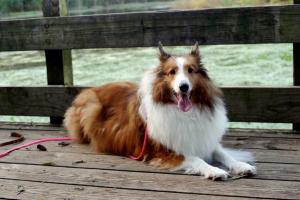
Visit the Save the Children website for more information: http://www.savethechildren.org/GetReady


View Next 25 Posts
Originally posted on Writing and Illustrating:






 Jersey Farm Scribe here on…
Jersey Farm Scribe here on… Jersey Farm Scribe here on…
Jersey Farm Scribe here on…













 Liza Leissig of the Liza Royce Agency has agreed to be our First Page Guest Critiquer for October.
Liza Leissig of the Liza Royce Agency has agreed to be our First Page Guest Critiquer for October.







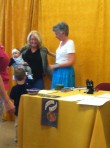
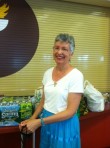
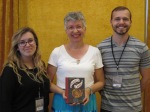
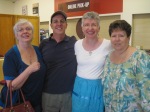
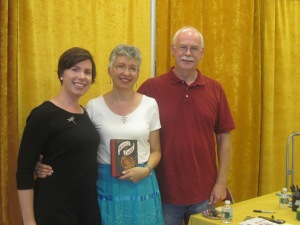
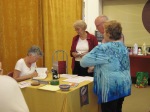
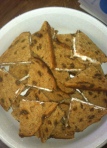
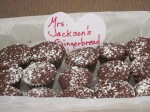
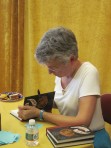
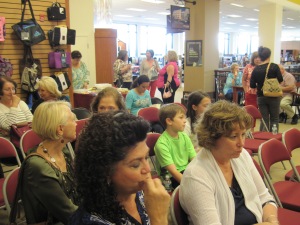
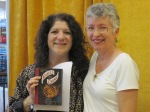
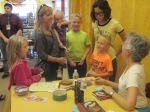
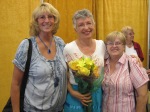
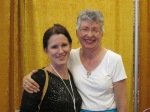
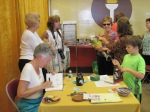
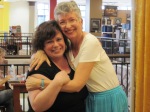
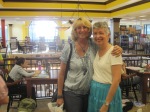
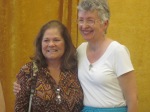
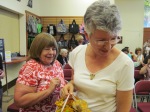
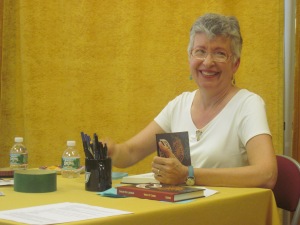
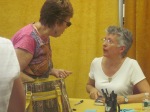
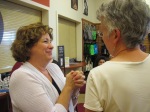
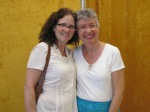
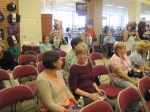
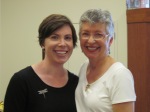
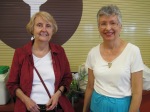
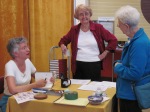
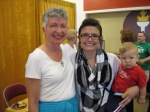
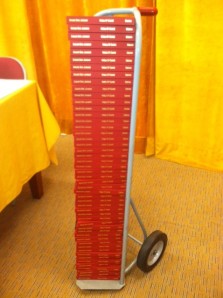

































This was a very interesting perspective on the possible pitfalls of research! Great job, Terry :)